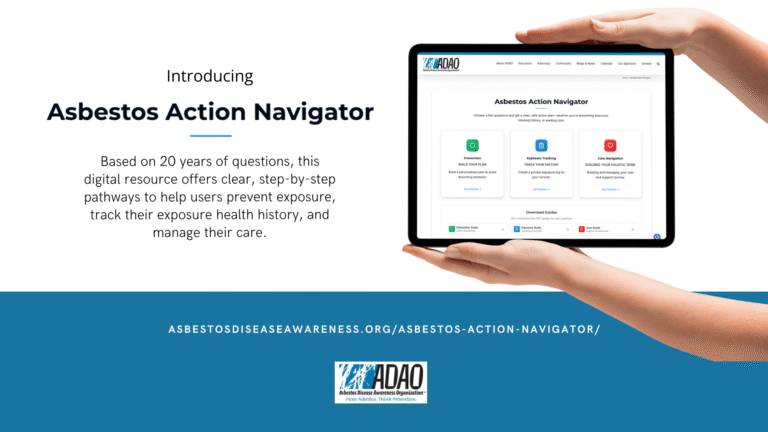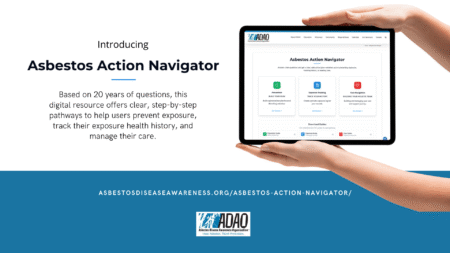Updated on September 18, 2025
Posted on June 30, 2025
The Alan Reinstein Ban Asbestos Now (ARBAN) Act of 2025: A Legislative Path Toward Ending All Asbestos in America

Thanks to Senator Jeff Merkley, Representative Suzanne Bonamici, and now Representative Don Bacon, the first Republican to co-sponsor the bill, Congress has an opportunity in 2025 to finally pass a comprehensive, bipartisan ban on all forms of asbestos, in all uses.
A Proven Legislative Track Record
ARBAN has been thoroughly vetted. In 2019, the U.S. House Energy and Commerce Committee passed the bill with a decisive 47–1 bipartisan vote. Despite this progress, a technical hurdle blocked it from receiving a floor vote.
In 2022 and 2023, the Senate Environment and Public Works Committee held hearings that reinforced the bill’s scientific, legal, and public health urgency. It has been clear for years that the bill has strong support in Congress despite the fact that political delays have blocked previous versions. This year, momentum is yet again building with growing awareness, EPA action, and renewed Congressional support.
In 2025, the reintroduction of ARBAN comes as the EPA’s 2024 Part 1 Chrysotile Asbestos Rule faces legal threats and criticism for its limited scope, as it only bans a single asbestos fiber type and leaves dangerous loopholes open. Lawsuits from industry, led by the American Chemistry Council and state affiliates, have already challenged the EPA’s rule in the same court circuit that struck down a broader asbestos ban in 1989, making the future of agency-based bans uncertain and vulnerable to rollback. Advocacy groups, such as ADAO, physicians, and public health organizations, have intervened to defend the science and strengthen the rule, but their efforts are still bound by the rule’s legal fragility and narrow reach.
Unlike EPA regulatory actions, ARBAN is federal legislation, so passing it into law removes loopholes, bans all asbestos types and uses, and, crucially, shields the ban from court challenges that have undermined public health for decades. With ARBAN, Congress ensures the ban on asbestos cannot be delayed, weakened, or challenged in the courts, providing the only comprehensive and enduring solution to protect Americans from asbestos-related disease and prevent history from repeating itself.
What the ARBAN Act of 2025 Will Do
The 2025 ARBAN Act, reintroduced by Senator Merkley and Representative Bonamici, is a comprehensive legislative strategy to end asbestos exposure nationwide. It focuses on two main public health priorities:
- ARBAN will ban all commercial importation and uses of asbestos – and includes all six asbestos fibers as well as winchite and richterite.
- ARBAN fills the gaps to protect Americans from all types of asbestos and its potential uses – going beyond EPA’s 2024 ban of just six uses of chrysotile asbestos.
- As legislation, ARBAN will not be subject to legal challenges and will provide long-term certainty to industry and the public.
The chlor-alkali industry continues to import raw asbestos for diaphragm production. ARBAN requires these plants to transition to non-asbestos technology within five years.
Why We Still Need ARBAN in 2025
The Public Health Crisis Persists
“Asbestos has caused devastating suffering, disease, and death for decades, claiming more than 40,000 American lives every year. Since the EPA’s 1989 asbestos ban was overturned, more than one million Americans have died from entirely preventable asbestos-caused diseases. It is long past time to end asbestos use in the United States and stop the tragedies that continue to devastate families like mine,” said Linda Reinstein, President and Co-Founder of the Asbestos Disease Awareness Organization. “For the first time, the Alan Reinstein Ban Asbestos Now (ARBAN) Act is bipartisan and being co-led in the House by Representatives Suzanne Bonamici and Don Bacon, with Senator Jeff Merkley championing the bill in the Senate. This bicameral leadership represents the only comprehensive and durable solution to finally eliminate asbestos from commerce and protect all Americans, especially workers, first responders, consumers, children, and disadvantaged communities most at risk of exposure.”
“There is overwhelming consensus in the scientific community that there is no safe level of asbestos exposure. APHA continues to support legislation like the Alan Reinstein Ban Asbestos Now (ARBAN) Act to protect the public’s health by eliminating all asbestos imports and use.” Georges C. Benjamin, MD, Executive Director, American Public Health Association.
Legal Loopholes Remain
Despite the EPA’s progress, five of the six asbestos fiber types are still technically legal in the United States. ARBAN is the only legislative measure that would fully restrict all of them from imports and use now and in the future.
Asbestos Imports Continue
In 2022, asbestos imports surged by 300 percent, primarily for industrial use in the chlor-alkali sector. Without a ban, future imports remain a possibility, even as nearly 70 countries have already banned asbestos completely.
Broad and Bipartisan Support in 2025
ARBAN continues to earn support from across the aisle and among leading medical, labor, environmental, and public health organizations. Early endorsees include:
- American Public Health Association (APHA_
- Asbestos Disease Awareness Organization (ADAO)
- Center for Environmental Health (CEH)
- Collegium Ramazinni
- Environmental Information Association (EIA)
The United States cannot afford another year of inaction. While the EPA’s steps are important, only ARBAN offers a full and lasting solution. It is the only bill that protects workers, families, veterans, and future generations from the full scope of asbestos harm.
Let 2025 be the year we finally say: enough is enough. No more lives lost. Pass ARBAN.
Watch and Learn More
📺 Watch Sen. Jeff Merkley discuss ARBAN
📺 Watch Rep. Suzanne Bonamici’s ARBAN remarks
📘 Read the full text of the ARBAN Act of 2025 (coming soon)
Together, we are making change happen and are on the path to eliminating all asbestos-caused diseases.
Linda Reinstein


